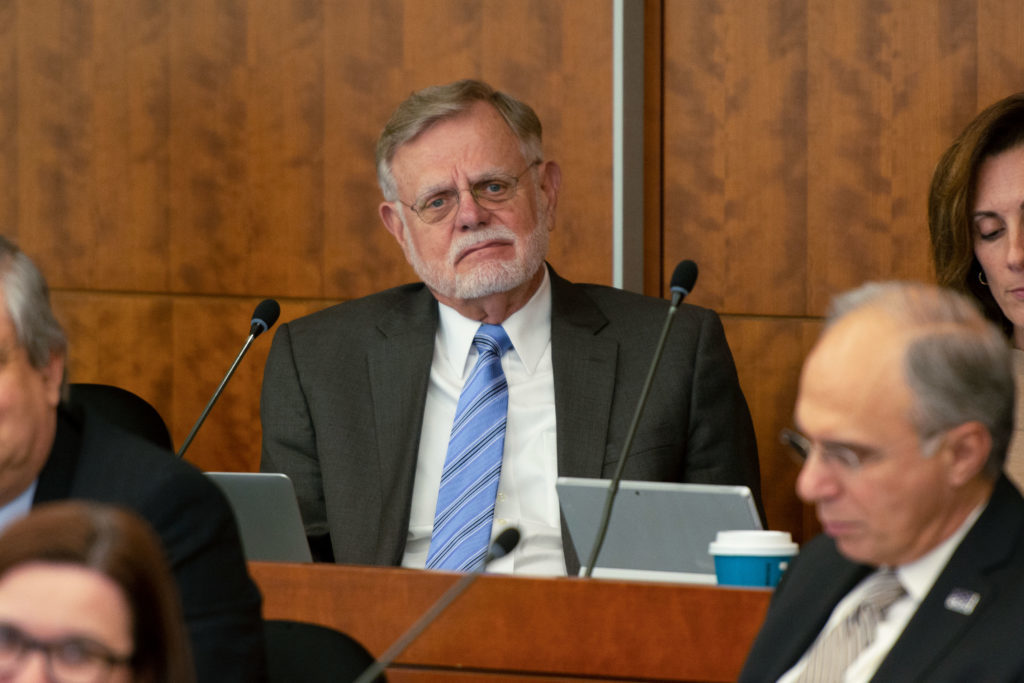Three professors in the Elliott School of International Affairs plan to retire at the end of the year, leaving behind a combined century of work at GW.
Professors Edward McCord, Henry Nau and Ronald Spector have taught, researched and held administrative positions at the school for roughly 25, 45 and 30 years, respectively. Reuben Brigety, the dean of the Elliott School, said in a press release last week that the professors “leave an enduring legacy and will be sorely missed by colleagues and students.”
McCord, a professor of history and a former vice dean at the Elliott School, has held 13 different administrative roles during his tenure, including a multiyear stint as the director of the Sigur Center for Asian Studies – but he said he has most enjoyed interacting with students in his classes. He often taught classes outside Chinese history – his main area of focus – which he said he enjoyed because he could study and learn new things to teach his students.
Before coming to GW in the early 1990s, McCord worked at the University of Florida, where he said he only interacted with others in his department. But at GW, faculty across multiple disciplines collaborate with one another on events and research, he said.
“As an academic, you kind of narrow yourself down,” he said. “Being at the Elliott School forces me to broad out again and recognize these other perspectives.”
McCord said he is most proud of creating the Taiwan Resource Center, one of the few collections of research and text exclusively about Taiwan in the United States. He said that after he retires, he will continue to teach at the Foreign Service Institute at the state department and will finish a personal research project that he has been working on for about two decades.
Nau, a professor of international affairs and a member of the Faculty Senate, is known for his conservative views and served as a National Security Council staffer in the Ronald Reagan administration. He has voiced concerns about academic freedom and the imbalance of political views at GW.
“It would be a lot better if they were better balanced,” he said. “I think this University could improve dramatically if it could get more faculty who are conservative.”
Nau said that after he goes on research leave next academic year, he will retire and finish his book on Ronald Reagan.
He said during his tenure, the Elliott School blossomed from a three-room, six-person operation to a school that enrolls more than 2,000 students. Because the Elliott School focused on the quality of its students when he was the school’s first associate dean, he said the school was able to attract quality deans and faculty to help the prestige of the school grow without much help from the administration.
“We asked the University president at the time for more money, and he said, ‘show me what you got,’” Nau said.
Nau said he is most proud of the scholarship and writing he completed during his time at GW, including four single-author books and a textbook that is in its seventh edition.
Ronald Spector, a professor of history, was the first civilian to become the director of naval history and head at the national organization the Naval Historical Center. He said he will teach one course in the fall and will continue conducting research and writing in military history.
He said D.C. has been a central location for many of his research sources on military history, adding that GW has funded his research and given him travel grants for leaves of absence and visits to other universities. Spector was the recipient of four Fulbright scholarships during his tenure at GW, he added.
Spector said that since he came to GW almost 30 years ago, he has watched students improve year after year. He said students in the history department and the Elliott School are comparable to students at top universities.
“In assigning readings for courses, I would have to ask myself, ‘Well, is this going to be too hard for the students?’” he said. “About the third or fourth year at GW, the students were so good that they could handle any kind of material.”




